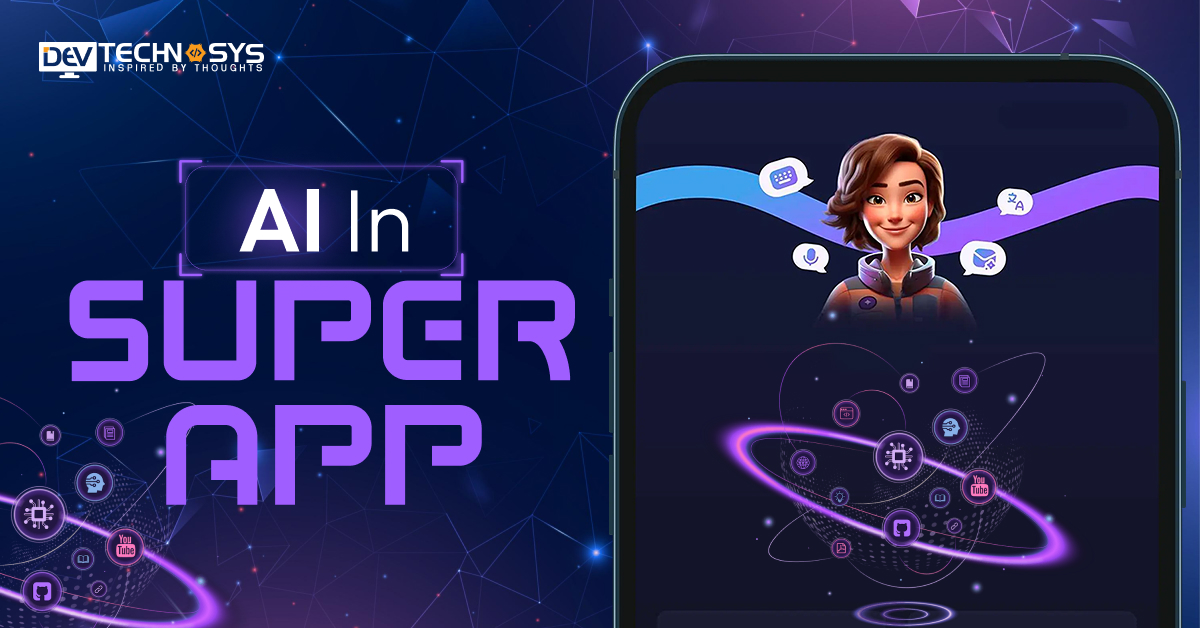Imagine having a helpful friend who never sleeps and always gives the right answers, that’s what Artificial Intelligence (AI) does in a Super App!
In today’s fast digital world, customers want quick and smart support.
AI makes that possible by using powerful tools like chatbots and smart systems that understand and respond just like real humans.
With AI, a Super App becomes a one-stop solution for help, anytime and anywhere.
It answers questions, solves problems fast, and even learns from past issues to do better next time. This makes customers happy and saves time for support teams.
In this dynamic blog, we will explore the role of AI in super app for smarter customer support and other related information.
Let’s start!
What Are Super Apps?
Super apps are mobile platforms that can do many things at once. They combine many services into one app, like shopping, food delivery, texting, payments, ride-hailing, and more. They are based in Asia and want to be a digital environment where people can get everything they need every day. If you build a property management app with AI and a super app, it offers different features in one app. Super apps make things easier for users, get them more involved, and make sure that customers have a smooth, connected experience across all services and industries.
- Multi-Functionality
- Mini-Programs or Micro-Apps
- Personalized Experience
- Customer Support Integration
Major Challenges in Traditional Customer Support
Traditional customer support faces several major challenges, including high volumes of queries, limited availability, slow response times, and inconsistent service quality. Other issues include a lack of personalization, language barriers, and high operational costs. These problems can lead to customer frustration, reduced loyalty, and inefficiencies for businesses.
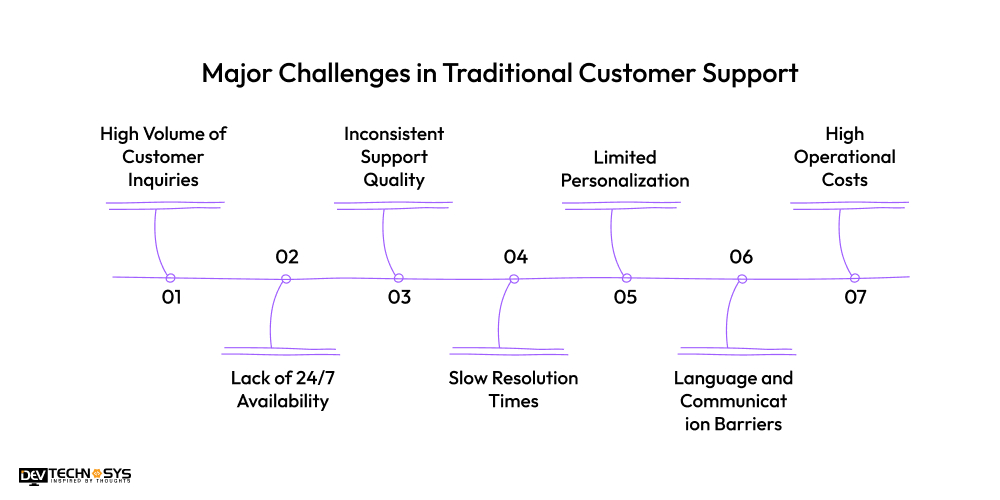
1. High Volume of Customer Inquiries
Traditional support staff can receive an excessive number of requests, particularly at peak hours. Limited manpower and resources make it difficult to respond quickly, resulting in delays, extended wait times, and customer displeasure. This has a detrimental influence on consumer happiness, retention, and overall brand reputation.
2. Lack of 24/7 Availability
Most traditional support systems have set hours, leaving consumers without assistance at night, on weekends, or during vacations. This constraint may frustrate customers in various time zones or those who want immediate assistance, resulting in missed business opportunities and bad user experiences.
3. Inconsistent Support Quality
Communication skills, product expertise, and problem-solving aptitude can all differ across human agents. This discrepancy results in unexpected service quality, affecting brand confidence. Customers demand consistent and precise replies, and a single negative contact might jeopardize long-term commitment.
4. Slow Resolution Times
Without AI automation in mobile super apps, fixing even minor issues might take hours or days. Manual ticket handling, team handoffs, and a lack of context all delay problem resolution, frustrating customers and reducing efficiency. Implementing AI in automobile app development can streamline support, accelerate responses, and significantly improve overall service quality and operations.
5. Limited Personalization
Traditional assistance frequently lacks access to real-time client data, rendering conversations generic and impersonal. This annoys consumers who anticipate personalized solutions based on their history, preferences, or past concerns. Poor customisation can lead to decreased customer happiness and engagement.
6. Language and Communication Barriers
Serving a varied client base is tough when representatives speak only a few languages or utilize ambiguous terminology. Misunderstandings cause wrong resolutions, frequent interactions, and consumer discontent, particularly in global markets or multilingual areas.
7. High Operational Costs
Maintaining huge support teams, training employees, and managing tools and infrastructure is expensive. The cost to maintain an app rises as user bases expand, yet there is no assurance of improved service quality. Traditional support approaches frequently fail to grow economically and efficiently.
The Role of AI in Super Apps: AI-Powered Support
AI-powered support in super apps enhances customer service by providing 24/7 assistance, personalized experiences, and faster issue resolution. Through chatbots, NLP, and machine learning, AI reduces operational costs, improves user satisfaction, and ensures scalable, multilingual support, making customer interactions more efficient, intelligent, and seamless across diverse services.
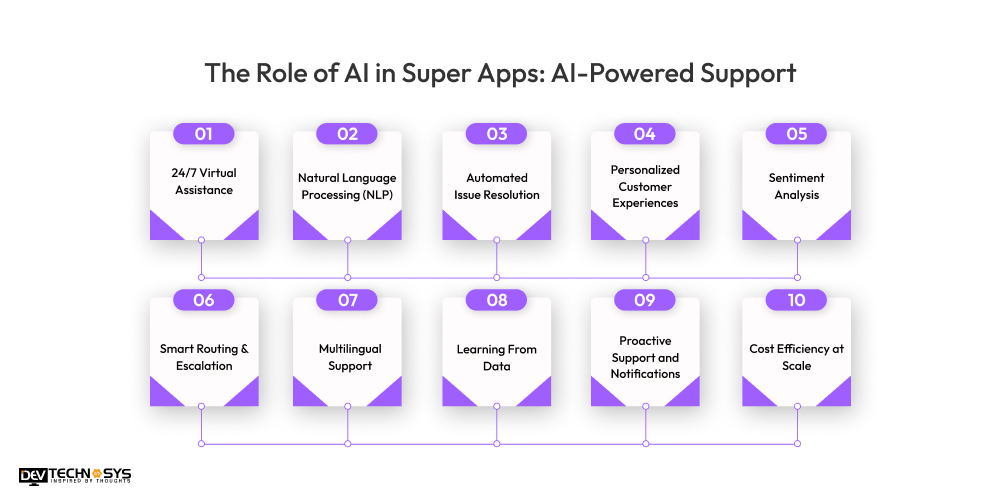
1. 24/7 Virtual Assistance
AI chatbots in super applications enable ongoing help by addressing user questions at any time without the need for human interaction. Artificial intelligence development services provide constant customer support, even on nights, weekends, and holidays, allowing businesses to serve worldwide audiences more effectively while lowering wait times and enhancing customer satisfaction.
2. Natural Language Processing (NLP)
NLP allows AI to interpret and respond to user messages in human language. This enables chatbots and support systems to automatically comprehend inquiries, deliver relevant replies, and manage conversations, thereby increasing cross-lingual communication and minimizing misunderstandings during customer encounters.
3. Automated Issue Resolution
Common difficulties, such as order tracking, password resets, and refund requests, may be resolved promptly by AI systems without the need for a human agent. AI in oil and gas and super apps speeds up help operations, decreases the support team’s effort, and provides users with prompt, correct responses to regular inquiries.
4. Personalized Customer Experiences
Super app personalization using AI to analyze user behavior, preferences, and history to personalize support interactions. AI-driven user personalization in super apps provides product recommendations, appropriate replies, or proactive support based on user profiles, personalizing the experience and enhancing user happiness and engagement with the app.
5. Sentiment Analysis
AI systems may recognize the emotional tone of a customer’s communication, such as dissatisfaction or satisfaction, and tailor answers appropriately. AI in food delivery apps and super apps allows us to prioritize important issues, quickly route furious clients to human agents, and maintain a more empathic, human-like engagement.
6. Smart Routing & Escalation
AI systems examine the type and complexity of questions before routing them to the appropriate department or human agent. They guarantee that significant issues are escalated immediately and prevent needless transfers, resulting in faster resolution and a more seamless support experience.
7. Multilingual Support
Artificial intelligence allows automated translation and multilingual communication, allowing super applications to offer customers in their preferred language. This eliminates language barriers, broadens access into varied markets, and assures uniform service quality across areas.
8. Learning From Data
AI always learns from previous encounters to provide better future answers. With the help of AI-enabled super app development services, the system recognizes frequent issues, tailors replies, and optimizes help flows over time, making the support system smarter and more efficient with each user encounter.
9. Proactive Support and Notifications
AI can predict consumer demands by evaluating usage trends and previous behavior. It delivers useful advice, notifications, or reminders before problems arise, minimizing inbound requests and offering a more seamless experience without customers having to seek assistance.
10. Cost Efficiency at Scale
By automating repetitive processes and eliminating dependency on big support personnel, AI drastically reduces operating expenses. Super applications can grow customer service without increasing manpower, allowing companies to serve millions of customers efficiently and affordably.
10 Use Cases and Examples
AI consulting for super app architecture in the UAE’s biggest mega applications and digital platforms, including Careem, Noon, Etisalat, and DubaiNow, improves user experiences by automating queries, customizing help, and resolving difficulties quickly. These real-world examples demonstrate how AI enables efficient, multilingual, and scalable assistance in a variety of sectors and services.
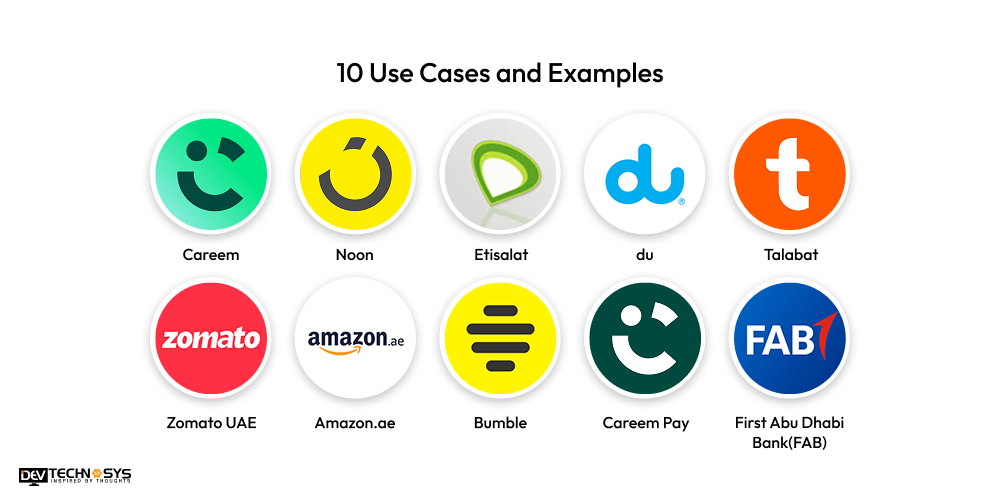
1. Careem
Careem’s AI chatbots offer 24-hour transportation booking, cancellation, and payment help in several languages. Careem’s AI-powered taxi app development system handles a huge number of client inquiries promptly, increasing user satisfaction and operational efficiency throughout the UAE and the MENA region.
2. Noon
Build an AI-powered super app like Noon to handle order monitoring, returns, refunds, and general queries. This automation streamlines customer care for the popular UAE e-commerce platform, decreasing wait times and allowing for faster issue resolution.
3. Etisalat
Etisalat utilizes AI virtual assistants to assist clients with invoicing, service upgrades, and troubleshooting. The solution provides immediate responses, eliminating the requirement for contact center involvement and offering quick, easy service throughout the UAE.
4. du
AI-powered chatbots manage account questions, plan modifications, and service requests. The automation improves the customer experience by providing tailored, efficient help, reducing response times, and supporting many languages.
5. Talabat
Talabat uses AI chatbots to notify consumers of purchase progress, handle refunds, and resolve delivery concerns. This AI for customer engagement in super apps increases client interaction while reducing the operational strain on human workers.
6. Zomato UAE
Zomato’s AI chatbots help customers with restaurant reservations, order monitoring, and feedback collection. The clever technology personalizes interactions, handles huge inquiry volumes, and speeds up issue resolution.
7. Amazon.ae
Amazon UAE employs AI to offer tailored product suggestions and customer assistance. AI-powered technologies handle complaint resolution and order processing, increasing consumer happiness on the platform.
8. Bumble
Bumble uses AI-powered customer support to enhance user safety and experience. Its AI tools detect harmful content, verify profiles, and filter inappropriate messages. If you build an AI-powered dating app, it helps users with common issues, while machine learning enhances query handling, ensuring fast and accurate results.
9. Careem Pay
Careem Pay’s AI identifies fraud and promptly resolves transaction concerns via automated customer service. The solution offers safe, efficient wallet management and builds confidence among UAE users.
10. First Abu Dhabi Bank(FAB)
FAB utilizes AI chatbots for loan queries, card administration, and transaction history. According to the AI mobile platform development company, it offers tailored financial assistance, enhancing accessibility and client experience at the UAE’s largest bank.
Various Types of AI Technologies Used in Super App Support
Various AI technologies power smarter customer support in super apps, including chatbots, natural language processing (NLP), machine learning, sentiment analysis, and predictive analytics. These tools automate responses, understand user intent, personalize experiences, and enable proactive support, resulting in faster, scalable, and more efficient service across diverse app functionalities.
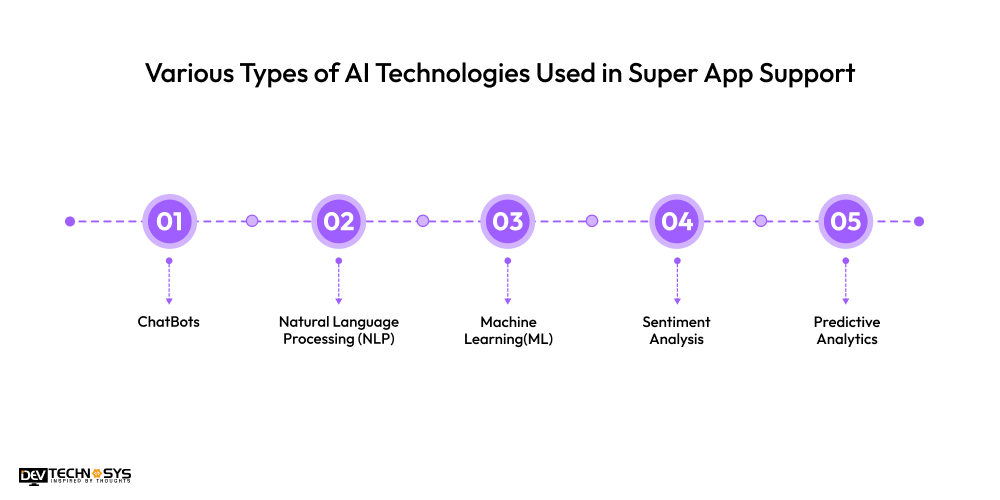
1. Chatbots
AI-powered chatbots respond to client inquiries instantaneously, automating answers to popular questions. They replicate human interactions, provide 24-hour support, and lessen the stress on human agents. AI chatbots for super apps increase the speed, consistency, and user experience of many services in a super app.
2. Natural Language Processing (NLP)
NLP helps AI recognize, interpret, and respond to human language. It enables smart applications to parse user communications, discern intent, and offer meaningful responses in several languages, making customer service more conversational, accurate, and accessible to a wide range of audiences.
3. Machine Learning(ML)
Machine learning allows AI to learn from user interactions and improve continually over time. Machine learning in super apps helps enhance chatbot replies, forecast customer requirements, and tailor assistance based on user behavior, resulting in a better and more adaptable service experience.
4. Sentiment Analysis
AI and data intelligence in super apps approach identify user communications’ emotional tone, such as dissatisfaction or satisfaction. Hire AI developers for super applications to prioritize important issues, route complaints to human agents, and sustain sympathetic conversation, therefore improving customer experience and lowering turnover.
5. Predictive Analytics
Predictive analytics employs artificial intelligence (AI) to examine historical and real-time data in order to anticipate future difficulties or behaviors. Custom AI-based super app solutions utilize it to anticipate support requests, automate proactive notifications, and reduce service disruptions, resulting in smoother customer journeys and improved resource allocation.
Benefits of AI in Super App Support
AI enhances super app support by delivering consistent, scalable, and secure service. It reduces agent burnout, integrates cross-service assistance, and provides real-time insights, improving efficiency and customer satisfaction. These benefits enable super apps to offer seamless, reliable, and personalized support at scale.
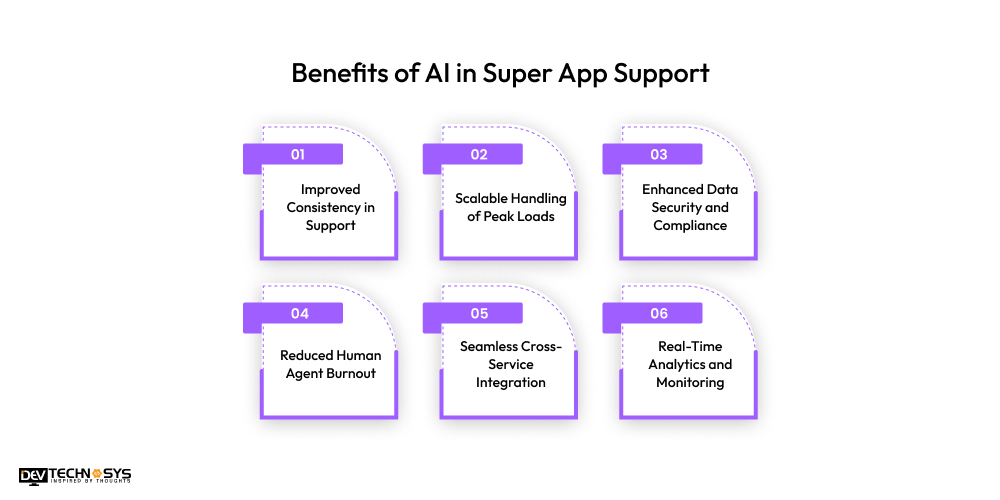
1. Improved Consistency in Support
AI ensures uniform responses by following predefined guidelines and learning from vast datasets. This reduces human error, bias, and variability in customer service, offering users a reliable and consistent experience every time they interact with the super app’s support system.
2. Scalable Handling of Peak Loads
During high-demand periods, AI support systems can instantly scale to manage surges in customer queries without degradation in service quality. Unlike human teams, AI can process unlimited simultaneous interactions, preventing bottlenecks and ensuring smooth, uninterrupted assistance.
3. Enhanced Data Security and Compliance
AI tools can automatically monitor support interactions for sensitive information, enforce compliance with data protection laws, and flag suspicious activities. According to the mobile app development company, this helps super apps safeguard user privacy and meet regulatory standards without sacrificing support quality or speed.
4. Reduced Human Agent Burnout
By automating repetitive and simple tasks, AI frees human agents to focus on complex, meaningful customer issues. This reduces workload stress, prevents burnout, and improves job satisfaction, ultimately leading to better service quality and lower staff turnover.
5. Seamless Cross-Service Integration
AI in super apps can coordinate support across multiple services within a super app, providing users with a unified experience. For example, AI can link payment issues to ride-hailing services or shopping queries to delivery status, enabling smoother, end-to-end customer journeys.
6. Real-Time Analytics and Monitoring
AI-powered systems generate real-time reports on support performance, user sentiment, and emerging issues. With the help of Android app development services in UAE, businesses can quickly adapt strategies, optimize resources, and continuously improve customer support effectiveness within the super app ecosystem.
Future Trends of AI in Super Apps
AI in super apps is evolving with voice-activated support, generative AI for dynamic assistance, and hyper-personalization through deep learning. Integration with IoT devices and predictive customer support will enhance user experiences, enabling proactive, seamless, and highly customized interactions across diverse digital services.
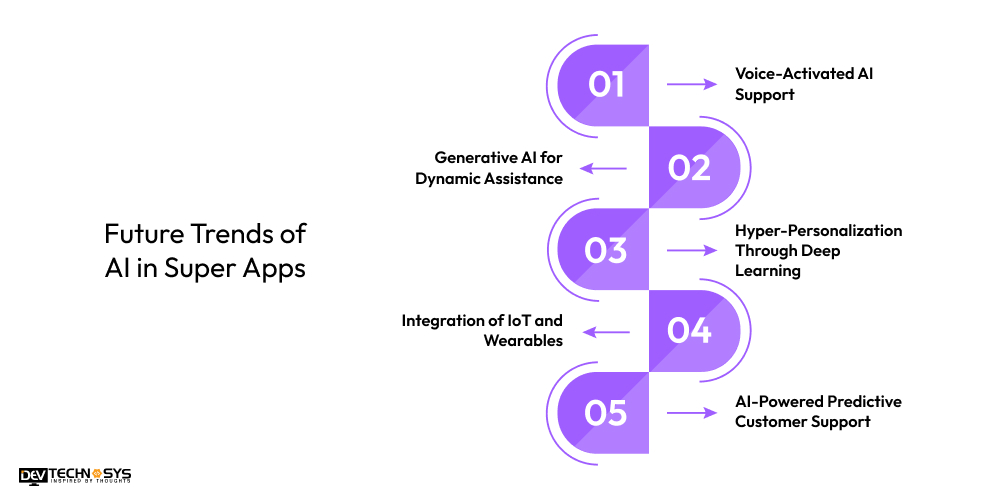
1. Voice-Activated AI Support
Voice-enabled AI in super apps is set to become a prominent feature in smart applications, allowing users to communicate through natural voice rather than typing. This hands-free strategy improves accessibility for all users, including those who multitask or have impairments. Voice assistants will answer complicated questions, give real-time assistance, and create more conversational, human-like experiences.
2. Generative AI for Dynamic Assistance
Generative AI models will transform customer service by providing tailored, context-aware replies on the go. Unlike scripted chatbots, these AI helpers will provide unique content, solve complicated problems, and dynamically alter responses depending on real-time input. This technology enables super applications to offer deeper, more meaningful interactions than plain FAQs.
3. Hyper-Personalization Through Deep Learning
AI will employ deep learning to evaluate massive volumes of user data in order to provide hyper-personalized experiences within super applications. This implies that help and suggestions will be customized not only to generic user profiles, but also to current behaviors, preferences, and context. Such customization anticipates user demands, providing proactive solutions and highly relevant material.
4. Integration of IoT and Wearables
Future super applications will combine artificial intelligence (AI) with Internet of Things (IoT) devices and wearables to deliver proactive, context-driven help. An iOS app development company can integrate AI to scan real-time data from smart devices, such as health monitors, smart homes, and linked cars, to anticipate user demands and provide prompt support. For example, AI may notify a user of a low battery on a wearable device or provide smart recommendations in super apps, or recommend maintenance for a smart device.
5. AI-Powered Predictive Customer Support
Predictive AI will help by foreseeing future problems before they affect consumers. AI can detect hazards or common issues early on by evaluating behavior patterns, transaction histories, and system data. This allows super applications to provide solutions, give alarms, and automatically resolve issues, decreasing downtime and irritation.
Final Words
AI in super app transforming customer support by enabling faster, personalized, and scalable assistance. With features like AI-powered chatbots, predictive analytics, and multilingual support, users enjoy seamless, efficient service across multiple functions. For businesses, integrating AI enhances customer satisfaction while reducing operational costs. If you’re looking to build such intelligent solutions, partnering with a trusted super app development company in UAE can accelerate innovation and deliver tailored, AI-driven customer support experiences.
Frequently Asked Questions
1. What Is AI-Powered Customer Support In Super Apps?
AI-powered customer support in super apps uses artificial intelligence technologies like chatbots and machine learning to provide instant, personalized, and automated assistance, improving response times and enhancing the overall user experience across multiple services.
2. What Types Of AI Technologies Are Used In Super App Support?
Super app support uses AI technologies such as chatbots, natural language processing (NLP), machine learning, sentiment analysis, and predictive analytics to automate customer interactions, understand user intent, personalize responses, and improve overall support efficiency and accuracy.
3. How Does AI Help Reduce Operational Costs?
AI reduces operational costs by automating repetitive customer support tasks, handling large query volumes without extra staff, minimizing human errors, and improving efficiency, allowing businesses to scale support while saving time and resources.
4. What Industries Benefit Most From AI-Powered Super App Support?
Industries like retail, finance, healthcare, telecommunications, and transportation benefit most from AI-powered super app support by delivering faster, personalized service, reducing costs, and managing high volumes of customer interactions efficiently across multiple channels.
5. How Quickly Can AI Support Be Integrated Into A Super App?
AI support can be integrated into a super app within a few weeks to a few months, depending on the app’s complexity, required features, data readiness, and collaboration with an experienced AI super app development company.



